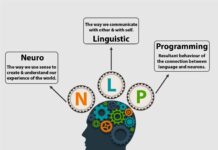
In the world of personal growth and communication, Neuro-Linguistic Programming (NLP) is a beacon that shines brightly. This innovative approach to understanding human behavior provides tools and techniques that can catalyze profound personal and professional transformation. This article delves into the intriguing world of NLP, unraveling its principles, techniques, and multifaceted applications.
Understanding the Basics of NLP
Neuro-Linguistic Programming is anchored in three fundamental aspects: neurology, language, and programming. These components provide the framework for understanding and influencing human behavior.
Neurology refers to how we perceive experiences through our senses and how these perceptions influence our thoughts and behaviors. Language represents the verbal and non-verbal communication systems we use to encode and interpret our experiences. Programming, in this context, pertains to our ability to change or ‘reprogram’ these perceptions and communications to achieve desired outcomes.
NLP is grounded in the principle that our thoughts, communication, and behaviors are interconnected. This means our internal thoughts, language patterns, and habitual behaviors are integrated and influence each other. Understanding these interactions provides a pathway to influencing our own behaviors and those of others, offering a powerful tool for personal and professional growth.

Personal Development and Self-Improvement
It is an excellent resource for personal development and self-improvement. It offers techniques that foster self-awareness, enhance self-esteem, and stimulate personal growth.
NLP can significantly enhance self-awareness and self-esteem. By harnessing this power, individuals can gain insights into their thought patterns, beliefs, and behaviors. This self-understanding can boost self-esteem, fostering a positive self-image and enhancing self-confidence.
Goal setting and goal achievement are vital components of personal success. With NLP techniques, individuals can elucidate their goals more clearly, devise robust strategies to attain them, and overcome hurdles that stand in their way. By adopting these techniques, individuals can transform their dreams into actionable goals and their goals into tangible results.
It offers powerful techniques for overcoming fears, phobias, and limiting beliefs. By changing the internal representations associated with these limiting factors, individuals can liberate themselves from past constraints and embrace a future of endless possibilities.
Effective Communication and Interpersonal Skills
NLP can also enhance communication effectiveness and interpersonal skills. It offers tools and techniques that foster clear, empathetic, and influential communication.
It enhances the effectiveness of communication by enriching individuals’ understanding of language patterns and non-verbal cues. By employing these NLP techniques, one can become a more attentive listener, articulate speaker, and influential communicator.
This technique also shines in building rapport with others. By mirroring and matching language patterns, body language, and other non-verbal cues, individuals can establish instant rapport, enhancing the effectiveness of their interpersonal interactions.
Conflict resolution is another area where NLP proves invaluable. By utilizing these strategies, individuals can navigate through disagreements more effectively, fostering understanding and compromise instead of hostility and deadlock. These skills are not only vital for personal relationships but also for professional environments where effective negotiation can make the difference between success and failure.

Overcoming Behavioral Patterns and Habits
NLP offers a comprehensive approach to identifying and changing undesirable behaviors and habits. Its methods empower us to break free from restrictive patterns, initiating transformative change in our lives.
Identifying and changing undesirable behaviors form the cornerstone of NLP. By helping us recognize our unhelpful behavioral patterns, NLP guides us towards constructive alternatives. It replaces self-limiting behaviors with empowering ones, paving the way for personal growth and success.
Breaking bad habits using NLP techniques is another potent application. Whether it’s procrastination, negative thinking, or any other detrimental habit, NLP offers practical strategies for breaking free. These techniques encourage new, healthier habits, fostering a positive cycle of self-improvement.
Emotional Intelligence and Stress Management
Emotional intelligence and stress management, essential components of mental health, can be significantly enhanced using this method. By understanding and managing emotions, we can navigate life’s challenges more effectively and maintain emotional balance.
Understanding and managing emotions is a crucial aspect of NLP. It encourages emotional self-awareness, fostering an understanding of our emotional triggers and responses. This heightened awareness allows us to manage our emotions more effectively, improving our mental health and quality of life.
This technique can significantly reduce stress and anxiety. By equipping us with practical stress management strategies, NLP enables us to maintain calm and composure in difficult situations. This resilience enhances our mental well-being and promotes a healthier, more balanced life.
Maintaining emotional balance in challenging situations is another area where NLP shines. By offering strategies to regulate emotions, it helps us stay centered amidst life’s storms. This emotional stability can markedly improve our response to stress, promoting a healthier, more harmonious life.

Therapeutic Applications: NLP in Psychology and Counseling
In the field of psychology and counseling, NLP has found significant application. Its techniques offer a fresh perspective to therapy, contributing to trauma recovery, phobia treatment, and addressing various mental health concerns.
NLP is frequently used in psychotherapy and counseling. Its techniques enhance therapeutic interactions, promote better understanding of emotional issues, and facilitate constructive change. NLP-based therapy can be particularly effective in resolving past traumas, managing anxiety, and promoting personal growth.
These techniques are highly effective in trauma recovery and phobia treatment. By changing our response to traumatic memories or fear-inducing stimuli, NLP enables us to overcome traumas and phobias. This approach can significantly improve mental health, freeing individuals from the chains of the past and the fear of the future.
It can address a range of mental health concerns, from stress and anxiety to depression and self-esteem issues. By promoting self-awareness, enhancing emotional regulation, and fostering healthier thought patterns, NLP contributes to improved mental health and well-being.
Conclusion
Neuro-Linguistic Programming is a multifaceted approach that offers valuable insights and practical tools for personal and professional growth. From enhancing self-awareness to improving communication, managing stress, and facilitating therapeutic transformations, NLP’s applications are extensive and significant.
As we journey through life’s challenges and triumphs, NLP can serve as a valuable ally. Its techniques empower us to understand ourselves better, communicate more effectively, lead influentially, and live more fully. Through NLP, we can break free from restrictive patterns, manage stress, and foster emotional balance.
Exploring NLP can be an enlightening journey of self-discovery and transformation. As we master NLP techniques, we don’t just become better professionals or leaders; we become better versions of ourselves. Encouraging you to delve into the world of NLP, we leave you with the thought that every step you take in this journey contributes to your personal and professional growth. Here’s to embarking on a journey that can transform your life in ways more profound than you dare to imagine.











